Pilot Average Salary in Fiji 2024
How much money does a person working as Pilot make in Fiji?

LOW
3,740
FJD AVERAGE
8,130
FJD HIGH
12,900
FJD
A person working as Pilot in Fiji typically earns around 8,130 FJD. Salaries range from 3,740 FJD (lowest) to 12,900 FJD (highest).
Salary Variance
This is the average salary including housing, transport, and other benefits. Pilot salaries in Fiji vary drastically based on experience, skills, gender, or location. Below you will find a detailed breakdown based on many different criteria.
Pilot Pay Scale and Salaries in Fiji

Salary Structure and Pay Scale Comparison
7,710 FJD or more
6,760 to 7,710 FJD
4,650 FJD or less
4,650 to 6,760 FJD
 3,740 FJD |
 7,770 FJD |
 12,900 FJD |
Median Salary, maximum and minimum salary, minimum wage, starting salary, and the salary range
Salary Range, Minimum Wage, and Starting Salary
Salaries for the position Pilot in Fiji range from 3,740 FJD (starting salary) to 12,900 FJD (maximum salary). It should be noted that the given figure is not the legally mandated minimum wage; rather, it represents the lowest figure reported in a salary survey that included thousands of participants and professionals from all regions of the country.
Median Salary
With a median salary of 7,770 FJD, half of the professionals who work as Pilot in Fiji earn less than this amount, and the other half earn more. The median salary denotes the middle value of salaries. Ideally, you would want to belong to the group earning more than the median salary, located on the right side of the salary distribution graph.
Percentiles and Salary Scale
The median is closely associated with two other values known as the 25th and 75th percentiles. By examining the salary distribution chart, it can be determined that 25% of professionals employed as Pilot in Fiji earn less than 6,260 FJD, while 75% earn more. Similarly, the chart shows that 75% earn less than 8,960 FJD while 25% earn more.
Pay Scale Structure
To provide a better understanding of expected salaries, we categorized the frequently occurring salaries into different ranges. This approach provides a more precise representation of salary distribution for the job title Pilot in Fiji compared to simply calculating the average. The majority of reported salaries, approximately 65%, fall within the range of 4,650 FJD to 6,760 FJD. About 20% of salaries are below the 4,650 FJD mark, while 10% fall within the range of 6,760 FJD to 7,710 FJD. Only 5% of individuals have salaries exceeding 7,710 FJD.
Salary Comparison by Years of Experience / Pilot / Fiji
How do experience and age affect pay?
| 0 - 2 Years | 4,250 FJD | |
| 2 - 5 Years | +34% | 5,670 FJD |
| 5 - 10 Years | +48% | 8,380 FJD |
| 10 - 15 Years | +22% | 10,200 FJD |
| 15 - 20 Years | +9% | 11,100 FJD |
| 20+ Years | +8% | 12,100 FJD |

The experience level is the most important factor in determining the salary. Naturally, the more years of experience the higher the wage. We broke down salaries by experience level for people working as Pilot and this is what we found.
Employees with less than two years of experience earn approximately 4,250 FJD.
While someone with an experience level between two and five years is expected to earn 5,670 FJD, 34% more than someone with less than two year's experience.
Moving forward, an experience level between five and ten years lands a salary of 8,380 FJD, 48% more than someone with two to five years of experience.
Additionally, professionals whose expertise span anywhere between ten and fifteen years get a salary equivalent to 10,200 FJD, 22% more than someone with five to ten years of experience.
If the experience level is between fifteen and twenty years, then the expected wage is 11,100 FJD, 9% more than someone with ten to fifteen years of experience.
Lastly, employees with more than twenty years of professional experience get a salary of 12,100 FJD, 8% more than people with fifteen to twenty years of experience.
Typical Salary Progress for Most Careers
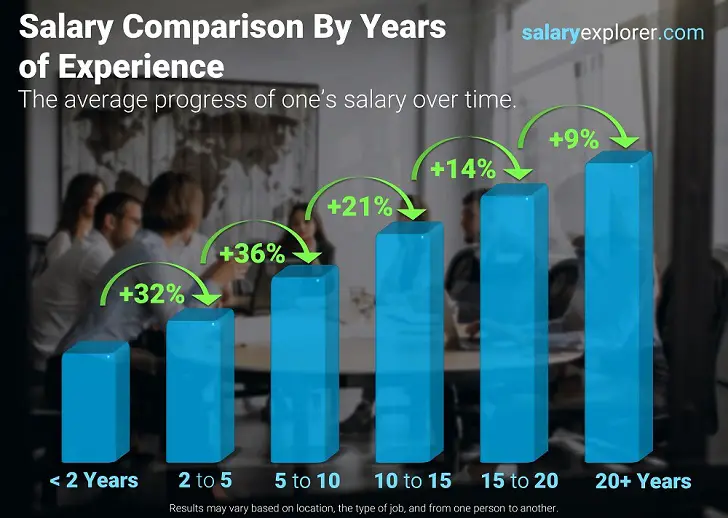
Salary Comparison By Education / Pilot / Fiji
How do education levels affect salaries?
Displayed below is the average salary variance between different education levels of professionals working as Pilot.
| Certificate or Diploma | 4,840 FJD | |
| Bachelor's Degree | +57% | 7,600 FJD |
| Master's Degree | +68% | 12,700 FJD |

We all know that higher education equals a bigger salary, but how much more money can a degree add to your income? We broke down salaries by education level for the position Pilot in order to make a comparison.
Level 1: Certificate or Diploma
Employees at this education level have an average salary of 4,840 FJD.
Level 2: Bachelor's Degree
At this level, the average salary becomes 7,600 FJD, 57% more than the previous level.
Level 3: Master's Degree
At this level, the average salary becomes 12,700 FJD, 68% more than the previous level.
Is a Master's degree or an MBA worth it? Should you pursue higher education?
A Master's degree program or any post-graduate program in Fiji costs anywhere from 24,100 FJD to 72,400 FJD and lasts approximately two years. That is quite an investment.
You can't really expect any salary increases during the study period, assuming you already have a job. In most cases, a salary review is conducted once education is completed and the degree has been attained.
Many people pursue higher education as a tactic to switch to a higher-paying job. The numbers seem to support the theory. The average increase in compensation while changing jobs is approximately 10% more than the customary salary increment.
If you can afford the costs of higher education, the return on investment is definitely worth it. You should be able to recover the costs in roughly a year or so.
Typical Salary Difference by Education for Most Careers
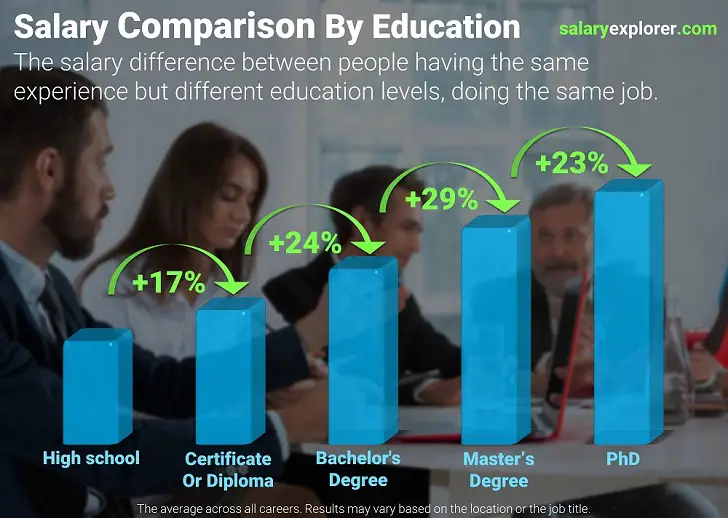
Salary and Compensation Comparison By Gender / Pilot / Fiji

Though gender should not have an effect on pay, in reality, it does. So who gets paid more: men or women? For the people who work as Pilot in Fiji, the average difference between the salary of male and female employees is 11%.
| Male | 8,550 FJD | |
| Female | -10% | 7,710 FJD |
Salary Comparison By Gender in Fiji for all Careers
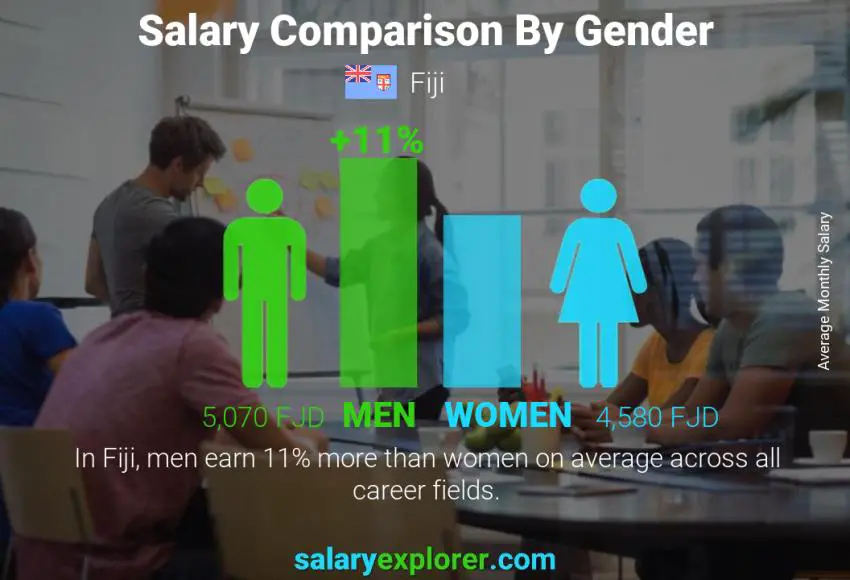
Average Annual Salary Increment Percentage / Pilot / Fiji
How much are annual salary increments in Fiji for individuals working as Pilot? How often do employees get salary raises?
Individuals working as Pilot in Fiji are likely to observe a salary increase of approximately 9% every 29 months. The national average annual increment for all professions combined is 5% granted to employees every 28 months.

Fiji / All Professions
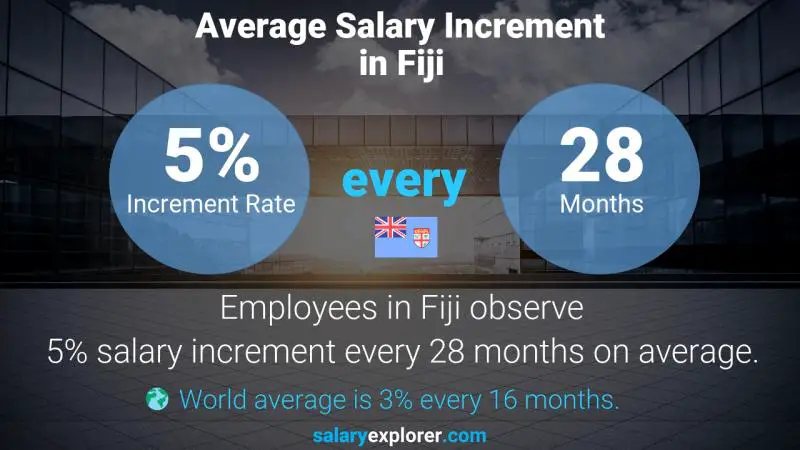
The term Annual Salary Increase usually refers to the increase in 12 calendar month period, but because it is rare that people get their salaries reviewed exactly on the one-year mark, it is more meaningful to know the frequency and the rate at the time of the increase.
How to calculate the salary increment percentage?
The annual salary Increase in a calendar year (12 months) can be easily calculated as follows: Annual Salary Increase = Increase Rate x 12 / Increase Frequency
Worldwide Salary Raises: All Countries and All Jobs
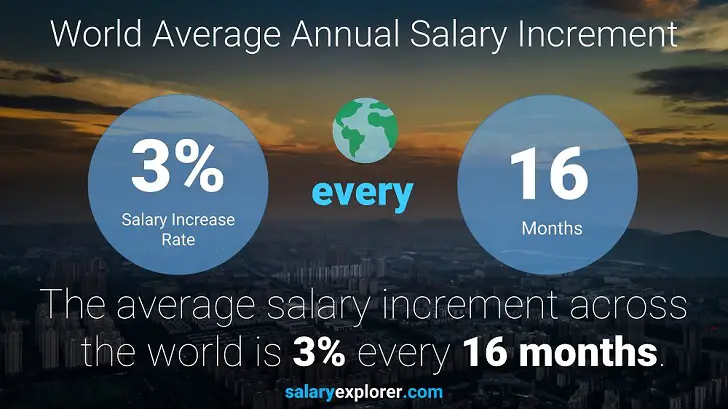
Salary Packages and Schemes
Not all compensation increases are reflected directly in the salary. Some companies offer upgraded packages to their staff instead of cash money. The figures displayed here account only for direct increments to the base salary.
Bonus and Incentive Rates / Pilot / Fiji
How much and how often are bonuses being awarded? Share This Chart Tweet Get Chart Linkhttp://www.salaryexplorer.com/charts/fiji/airlines-aviation-aerospace-defense/pilot/annual-salary-bonus-rate-fiji-pilot.jpg
Share This Chart Tweet Get Chart Linkhttp://www.salaryexplorer.com/charts/fiji/airlines-aviation-aerospace-defense/pilot/annual-salary-bonus-rate-fiji-pilot.jpg
32% of surveyed staff reported that they haven't received any bonuses or incentives in the previous year while 68% said that they received at least one form of monetary bonus.
Those who got bonuses reported rates ranging from 5% to 9% of their annual salary.
| Received Bonus | 68% | |
| No Bonus | 32% |
Types of Bonuses Considered
Individual Performance-Based BonusesThe most standard form of bonus, where the employee is awarded based on their exceptional performance.
Company Performance BonusesOccasionally, some companies like to celebrate excess earnings and profits with their staff collectively in the form of bonuses that are granted to everyone. The amount of the bonus will probably be different from person to person depending on their role within the organization.
Goal-Based BonusesGranted upon achieving an important goal or milestone.
Holiday / End of Year BonusesThese types of bonuses are given without a reason and usually resemble an appreciation token.
Bonuses Are Not Commissions!
People tend to confuse bonuses with commissions. A commission is a prefixed rate at which someone gets paid for items sold or deals completed while a bonus is in most cases arbitrary and unplanned.
What makes a position worthy of good bonuses and a high salary?
The main two types of jobs | |
| Revenue Generators | Supporting Cast |
Employees that are directly involved in generating revenue or profit for the organization. Their field of expertise usually matches the type of business. | Employees that support and facilitate the work of revenue generators. Their expertise is usually different from that of the core business operations. |
Example: | Example: |
Revenue generators usually get more and higher bonuses, higher salaries, and more frequent salary increments. The reason is quite simple: it is easier to quantify your value to the company in monetary terms when you participate in revenue generation.
Bonus Comparison by Seniority Level
Top management personnel and senior employees naturally exhibit higher bonus rates and frequencies than juniors. This is very predictable due to the inherent responsibilities of being higher in the hierarchy. People in top positions can easily get double or triple bonus rates than employees down the pyramid.
Average Hourly Wage / Pilot / Fiji
 47 FJD per hour
47 FJD per hourThe average hourly wage (pay per hour) for individuals working as Pilot in Fiji is 47 FJD.This is the rate they get paid for every worked hour.
About The Hourly Pay Rate
The hourly wage is the salary paid in one worked hour. Usually, jobs are classified into two categories: salaried jobs and hourly jobs. Salaried jobs pay a fixed amount regardless of the hours worked. Hourly jobs pay per worked hour. To convert salary into hourly wage the above formula is used (assuming 5 working days in a week and 8 working hours per day which is the standard for most jobs). The hourly wage calculation may differ slightly depending on the worked hours per week and the annual vacation allowance. The figures mentioned above are good approximations and are considered to be the standard. One major difference between salaried employees and hourly paid employees is overtime eligibility. Salaried employees are usually exempt from overtime as opposed to hourly paid staff.
What is the minimum hourly rate of pay?
The minimum pay rate per hour for people working as Pilot in Fiji is 22 FJD. This is the minimum as per the gathered data in the salary survey not the minimum hourly rate mandated by law.
Salary comparison with similar jobs
| Job Title | Average Salary |
| Airlines / Aviation / Aerospace / Defense |  -100% -100% | |
| Aeronautical Engineer | 4,960 FJD |  -39% -39% |
| Aerospace Engineer | 6,030 FJD |  -26% -26% |
| Aerospace Technician | 4,350 FJD |  -47% -47% |
| Air Crew Member | 2,840 FJD |  -65% -65% |
| Air Crew Officer | 3,270 FJD |  -60% -60% |
| Air Traffic Assistant | 2,680 FJD |  -67% -67% |
| Air Traffic Controller | 5,040 FJD |  -38% -38% |
| Air Traffic Management Automation Engineer | 5,180 FJD |  -36% -36% |
| Aircraft 3D Printing Technician | 4,440 FJD |  -45% -45% |
| Aircraft Assembler | 2,340 FJD |  -71% -71% |
| Aircraft Body Repairer | 2,230 FJD |  -73% -73% |
| Aircraft Cabin Interior Designer | 5,050 FJD |  -38% -38% |
| Aircraft Captain | 7,690 FJD |  -5% -5% |
| Aircraft Cybersecurity Specialist | 5,470 FJD |  -33% -33% |
| Aircraft Electrician | 2,480 FJD |  -69% -69% |
| Aircraft Electronics Techician | 2,510 FJD |  -69% -69% |
| Aircraft Engineer | 4,830 FJD |  -41% -41% |
| Aircraft Fueler | 2,240 FJD |  -72% -72% |
| Aircraft Maintenance Engineer | 4,360 FJD |  -46% -46% |
| Aircraft Maintenance Manager | 7,580 FJD |  -7% -7% |
| Aircraft Maintenance Supervisor | 4,830 FJD |  -41% -41% |
| Aircraft Maintenance Technician | 2,330 FJD |  -71% -71% |
| Aircraft Mechanic | 2,560 FJD |  -69% -69% |
| Aircraft Pilot | 8,160 FJD |  +0% +0% |
| Aircraft Pneudraulics Repairer | 2,350 FJD |  -71% -71% |
| Aircraft Quality Assurance | 6,170 FJD |  -24% -24% |
| Aircraft Rigging Assembler | 2,450 FJD |  -70% -70% |
| Aircraft Service Technician | 2,240 FJD |  -72% -72% |
| Airfield Management Specialist | 7,020 FJD |  -14% -14% |
| Airfield Operations Specialist | 5,680 FJD |  -30% -30% |
| Airline Augmented Reality Developer | 4,410 FJD |  -46% -46% |
| Airline Cabin Crew | 4,770 FJD |  -41% -41% |
| Airline Copilot | 5,350 FJD |  -34% -34% |
| Airline Customer Experience Designer | 5,070 FJD |  -38% -38% |
| Airline Data Analyst | 4,680 FJD |  -42% -42% |
| Airline Pilot | 7,970 FJD |  -2% -2% |
| Airlines Sales Director | 9,170 FJD |  +13% +13% |
| Airlines Sales Manager | 8,800 FJD |  +8% +8% |
| Airlines Structural Assembler | 2,100 FJD |  -74% -74% |
| Airport Services Agent | 3,160 FJD |  -61% -61% |
| Airport Services Manager | 9,950 FJD |  +22% +22% |
| Airport Services Supervisor | 5,770 FJD |  -29% -29% |
| Airport Sustainability Manager | 6,570 FJD |  -19% -19% |
| Assistant Aircraft Mechanic | 2,140 FJD |  -74% -74% |
| Autonomous Air Taxi Coordinator | 3,140 FJD |  -61% -61% |
| Aviation Analyst | 6,240 FJD |  -23% -23% |
| Aviation Biofuel Specialist | 4,890 FJD |  -40% -40% |
| Aviation Engineer | 5,130 FJD |  -37% -37% |
| Aviation Inspector | 5,560 FJD |  -32% -32% |
| Aviation Manager | 9,430 FJD |  +16% +16% |
| Aviation Operations Controller | 5,100 FJD |  -37% -37% |
| Aviation Resources Manager | 8,320 FJD |  +2% +2% |
| Aviation Safety Assistant | 2,690 FJD |  -67% -67% |
| Aviation Safety Manager | 8,720 FJD |  +7% +7% |
| Aviation Safety Officer | 5,050 FJD |  -38% -38% |
| Aviation Security Specialist | 5,880 FJD |  -28% -28% |
| Aviation Sustainability Consultant | 6,340 FJD |  -22% -22% |
| Aviation Technician | 2,320 FJD |  -71% -71% |
| Aviation Training Specialist | 5,340 FJD |  -34% -34% |
| Cargo and Freight Agent | 2,100 FJD |  -74% -74% |
| Cargo Executive | 4,560 FJD |  -44% -44% |
| Chief Pilot | 8,220 FJD |  +1% +1% |
| Drone Compliance Officer | 4,990 FJD |  -39% -39% |
| Drone Delivery Specialist | 4,320 FJD |  -47% -47% |
| Drone Emergency Response Coordinator | 3,880 FJD |  -52% -52% |
| Drone Engineer | 4,070 FJD |  -50% -50% |
| Drone Event Coordinator | 4,060 FJD |  -50% -50% |
| Drone Fleet Manager | 5,090 FJD |  -37% -37% |
| Drone Geospatial Analyst | 4,590 FJD |  -44% -44% |
| Drone Infrastructure Engineer | 5,200 FJD |  -36% -36% |
| Drone Inspection Specialist | 4,350 FJD |  -47% -47% |
| Drone Inspector | 4,120 FJD |  -49% -49% |
| Drone Insurance Underwriter | 3,430 FJD |  -58% -58% |
| Drone Light Show Choreographer | 4,070 FJD |  -50% -50% |
| Drone Operator / Pilot | 3,170 FJD |  -61% -61% |
| Drone Payload Specialist | 3,480 FJD |  -57% -57% |
| Drone Pilot Instructor | 3,970 FJD |  -51% -51% |
| Drone Security Specialist | 4,380 FJD |  -46% -46% |
| Drone Software Engineer | 3,980 FJD |  -51% -51% |
| Drone Surveyor | 3,610 FJD |  -56% -56% |
| Drone Technician | 2,900 FJD |  -64% -64% |
| Drone Traffic Controller | 2,990 FJD |  -63% -63% |
| Drone Traffic Management Specialist | 4,700 FJD |  -42% -42% |
| Drone Traffic Safety Engineer | 4,370 FJD |  -46% -46% |
| Drone Videographer | 3,720 FJD |  -54% -54% |
| First Officer | 3,510 FJD |  -57% -57% |
| Fleet Controller | 7,480 FJD |  -8% -8% |
| Fleet Management Officer | 3,360 FJD |  -59% -59% |
| Flight Attendant | 3,060 FJD |  -62% -62% |
| Flight Planner | 4,490 FJD |  -45% -45% |
| Flight Scheduler | 4,010 FJD |  -51% -51% |
| Flight Simulation Engineer | 4,370 FJD |  -46% -46% |
| Freight and Cargo Inspector | 3,520 FJD |  -57% -57% |
| Helicopter Pilot | 5,220 FJD |  -36% -36% |
| Loading Bridge Operator | 2,070 FJD |  -75% -75% |
| Pilot | 8,130 FJD |  -0% -0% |
| Ramp Agent | 2,000 FJD |  -75% -75% |
| Reservations Sales Agent | 2,730 FJD |  -66% -66% |
| Safety and Quality Specialist | 4,990 FJD |  -39% -39% |
| Test Pilot | 5,570 FJD |  -31% -31% |
| Unmanned Aerial Vehicle Operator | 3,790 FJD |  -53% -53% |
| Unmanned Aircraft Systems Technician | 3,460 FJD |  -57% -57% |
| Virtual / Augmented Reality Flight Simulator Designer | 4,700 FJD |  -42% -42% |
Government vs Private Sector Salary Comparison
Where can you get paid more, working in a private company or the government? The difference between the public or government sector salaries and the private sector salaries in Fiji is 25% on average across all career fields.
| Private Sector | 4,300 FJD | |
| Public Sector | +25% | 5,360 FJD |
Salary Statistics and Calculation Guide
What is considered to be a good and competitive salary for the job title Pilot in Fiji?
A good and competitive compensation would range anywhere between 7,770 FJD and 8,960 FJD. This is a very rough estimate. Experience and education play a very huge part in the final earnings.
Gross Salary (before tax) and Net Salary (after tax)
All salary and compensation figures displayed here are gross salary figures, that is the salary before tax deductions. Because taxes may differ across sectors and locations, it is difficult to accurately calculate the net salary after tax for every career.
Base / Basic Salary
The base salary for a careers like Pilot in Fiji ranges from 3,740 FJD to 6,260 FJD. The base salary depends on many factors including experience and education. It is not easy to provide a figure with very little information, so take this range with a grain of salt.
What is the difference between the median and the average salary?
Both are indicators. If your salary is higher than both the average and the median then you are doing very well. If your salary is lower than both, then many people earn more than you and there is plenty of room for improvement. If your wage is between the average and the median, then things can be a bit complicated. We wrote a guide to explain all about the different scenarios. How to compare your salary




